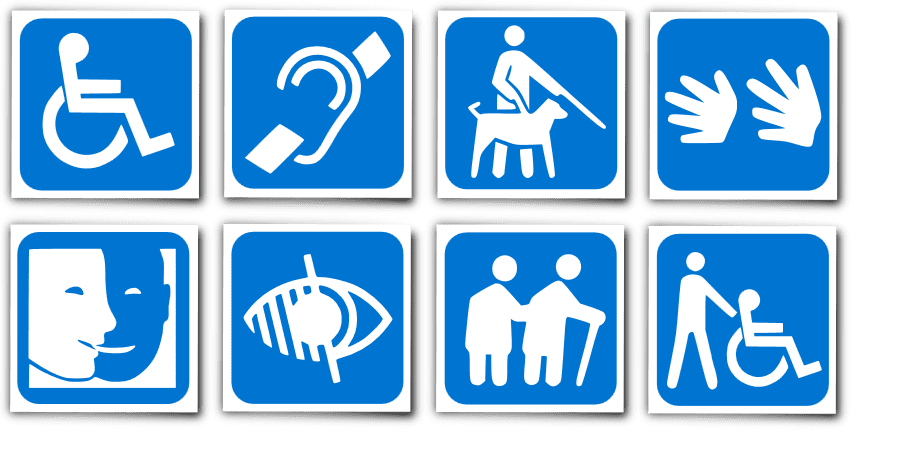French for everyone
Novexpat is committed to helping expatriates with disabilities or health conditions to learn and improve their French by providing the necessary adjustments to our French lessons.
They can also can also benefit from adjustments when taking official French exams.

Examples of possible adjustments
The possible adjustments are numerous as they are specific to each case of disability.
Here is a list of the possible adjustments we can currently make in our French classes according to some of the common types of disability.
People with physical disability
Our courses can take place online with a teacher through web conferencing. They can also take place face-to-face at the trainee's home or workplace or in a public place whose accessibility has been checked beforehand. For group lessons, we make sure the space can be easily accessible (with a wheelchair for example).
Vision impairment
Vision impairment refers to people who are blind or who have partial vision. Depending on the degree of disability, we can adapt the educational material with larger characters for example. We use audio supports (podcasts, spoken words) or references to accessible sites with text to speech technology. The written material is available in digital format so that it can be zoomed in easily. We do not support braille at the moment.
People who are deaf or hard of hearing
Hearing impairments can range from mild to profound. Although our teachers cannot speak sign language, we still can provide some specific assistance. In a remote learning environment, our teachers use a lot the chat at the same time as they speak. French video clips are subtitled. Written and visual learning material is always used. The teachers are used to adapting his flow and tone of voice.
People with cognitive impairment
It's common for people with cognitive impairment (including dyslexia) or ABI to experience increased fatigue, increased difficulty to process information or in areas such as memory, concentration and communication.
In this situation, we strongly advise to go for individual lessons. Our teachers can adapt to the learning profile and difficulties of the learner. They are used to repeat and rehearse concepts and words with extreme patience. We can adapt the duration and the intensity of the face-to-face class. Many exercises we offer during and after the class can help memorizing.
Our process to serve disabled learners
Our process is based on the process followed by France Education International , the French public entity responsible for the main official French exams (DELF, TCF,...) and the French Ministry of National Education, responsible for the French DCL exam. Please, note that the period of the enrollment process can take a longer time depending on the kinds and complexity of the necessary adjustments to implement.
During the online application process, you have the possibility to declare any kinds of disability you have that we should be aware of beforehand and to share with us any specific adjustments that could be useful so that you can follow your French classes in the best conditions.
During the interview, the pedagogical coordinator may ask you further explanations about the adjustments that would be required. If you cannot help further, we will ask you for a medical certificate that should describe which adjustments would be required. If necessary, the teaching team will seek the help of French public experts of training and disability to understand how to adapt the teaching program.
If we can make the necessary adjustments in a reasonable period of time before you can start your classes, the pedagogical coordinator will provide you all the details about the adjustement we can implement for your training and the conditions that apply.
In case we could not make the necessary adjustments in a reasonable period of time for you, we will let you know as soon as possible and will share details about other French language centers we know they could provide the necessary adjustments adapted to your disability.
💡
Did you know?
As a disabled person with a French residence permit (you would need a minimum A2 French level to obtain it), the AGEFIPH can provide you with services and financial assistance to enable you to access training, to facilitate your recruitment in a company, to help you set up your business and to help you maintain your job. Their services and financial aids are granted subject to conditions.